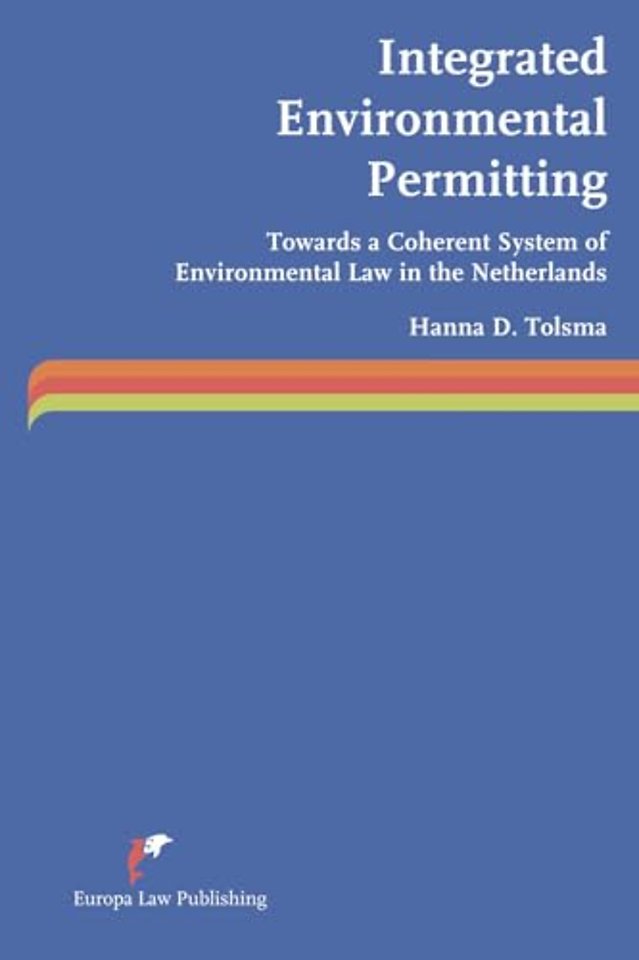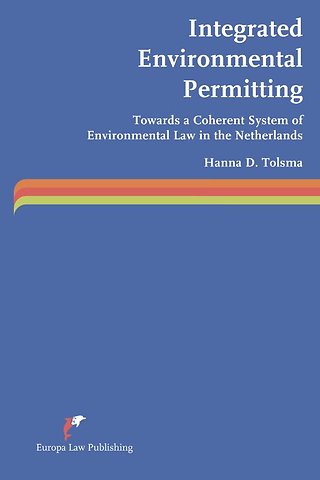Integrated Environmental Permitting
Towards a Coherent System of Environmental Law in the Netherlands
Samenvatting
Improving the quality of environmental law is high on the agenda of both the European Union and its Member States. In the Netherlands, there has been a series of changes of law in order to simplify and improve the complex and fragmented system of environmental law. However, the improvement of sectoral legislation has not led to the desired result.
The Dutch legislature now considers a fundamental reform of environmental law necessary. One of the main goals is to achieve a coherent approach towards the physical environment in policy, decision-making and regulations. The Environment and Planning Act brings together 26 acts and about 120 governmental decrees in the area of spatiality and planning, infrastructure, nature and water, in order to create a single act for the physical environment.
This book focuses on one of the key instruments of environmental law, the environmental permit. The integration of sectoral environmental permit systems is a way to simplify and speed up decision-making procedures for the authorisation of activities affecting the physical environment. The goal is to introduce a fully integrated environmental permit system. This means not only procedural integration of sectoral permitting systems but also substantive integration of the various assessment criteria.
This concept of integrated environmental permitting has generated a great deal of discussion in the Netherlands. In the context of this research, an overview will be given of developments in the field of integrated environmental permitting in Germany, Belgium and the Netherlands. Developments in EU environmental law and the new Dutch Environment and Planning Act are also included.
Specificaties
Inhoudsopgave
Contents vii
1. Introduction
1 Reason for this Study 2
2 Environmental Permitting in the Netherlands 3
3 Central Research Question 5
4 Approach and Methods 6
5 Outline of the Book 8
2. Concept of Integrated Environmental Permitting
1 Introduction 10
2 The Concept of Integration in Environmental Law 10
2.1 Integrated Pollution Prevention and Control 10
2.2 External Integration 13
2.3 Internal Integration 14
3 Integrated Environmental Permitting at EU Level 15
3.1 Industrial Emissions Directive 15
3.2 Integrated Approach Defined 18
3.3 Scope of the Assessment Framework 19
3.4 Incommensurability of Environmental Goods 21
3.5 No “One Stop Shop” Required 22
4 Summary and Conclusion 23
3. Developments in Germany, Belgium and The Netherlands
1 Introduction 26
2 Germany 27
2.1 Legislative Process of the Environmental Code in a Nutshell 27
2.2 Integrated Environmental Permitting System 29
2.3 Discussion 31
2.3.1 Added Value? 31
2.3.2 Scope of the Assessment Framework 32
2.3.3 The Degree of Integration 33
2.4 One-Decision Model: Plan Approval Procedure 34
3 Belgium (Flanders Region) 36
3.1 Integrated Environmental Permitting System 36
3.2 Discussion 39
4 The Netherlands 40
4.1 Integrated Environmental Permitting System 40
4.2 Discussion 43
4.2.1 Added Value? 43
4.2.2 Scope of the Assessment Framework 44
4.2.3 The Degree of Integration 45
4.3 Integrated Environmental Permitting System in Practice 45
5 Towards a Fully Integrated Environmental Permitting System? 46
5.1 The Goal of a Fully Integrated Environmental Permitting System 46
5.2 Discussion 47
5.3 Fully Integrated Environmental Permitting System Defined 48
6 Comparison Remarks 51
6.1 Design and Scope 51
6.2 Pros and Cons 53
6.3 Developments Compared 54
7 Summary and Conclusion 54
4. Constraints of EU Environmental Law
1 Introduction 58
2 Developments in EU Environmental Law 59
2.1 Towards the New Governance Approach 59
2.2 Fragmented EU Environmental Law 61
2.3 Concluding Remarks 63
3 Possibilities and Limitations 64
3.1 The Habitats Directive 65
3.1.1 Outline of the Habitats Directive 65
3.1.2 Is the Introduction of a Permit System Obligatory? 67
3.1.3 Evaluating 69
3.2 The Water Framework Directive 72
3.2.1 Outline of the Water Framework Directive 72
3.2.2 Is the Introduction of a Permit System Obligatory? 74
3.2.3 Evaluating 76
3.3 The Air Quality Directive 78
3.3.1 Outline of the Air Quality Directive 78
3.3.2 Is the Introduction of a Permit System Obligatory? 79
3.3.3 Evaluating 80
3.4 Concluding Remarks 80
4 Summary and Conclusion 82
5. The Constraints of National Law
1 Introduction 86
2 The Rule of Purpose-Specific Powers 86
3 Assessment Framework Rule of Purpose-Specific Powers 88
4 Review in the Light of the Rule of Purpose-Specific Powers 89
5 Summary and Conclusion 93
6. The New Environment and Planning Act
1 Introduction 96
2 Structure of the Environment and Planning Act 97
2.1 Scope of the Environment and Planning Act 97
2.2 Improvement Goals and Key Objectives 97
2.3 Policy Cycle, Key Instruments and View on Flexibility 99
3 A Fully Integrated Environmental Permitting System? 100
4 A Coherent Approach Towards the Physical Environment 102
4.1 Coherent Policy Planning 103
4.2 Area-Wide Environmental Planning Regulation 105
4.3 Tailor-Made Solutions: Bending the Rules 106
4.3.1 Programmatic Approach 107
4.3.2 Situation-Specific Regulation, Situation-Specific Rules, Equivalence Principle 108
4.3.3 Experimental Provision to Deviate from Standards 108
4.3.4 Project Decision 109
4.4 Discussion 109
4.4.1 Flexibility and Legal Certainty 110
4.4.2 Flexibility and Judicial Review 111
4.4.3 Relation to EU Environmental Law 112
4.4.4 Simple and Better? 113
4.4.5 Barriers for a Coherent Approach 113
5 Summary and Conclusion 114
7. Summary and Conclusions
1 Introduction 118
2 Concept of Integrated Environmental Permitting 119
3 Constraints of EU Environmental Law 120
4 Constraints of National Law 121
5 Towards a Coherent System of Environmental Law 123
Bibliography 127
Anderen die dit boek kochten, kochten ook
Rubrieken
- cadeauboeken
- computer en informatica
- economie
- filosofie
- flora en fauna
- geneeskunde
- geschiedenis
- gezondheid
- jeugd
- juridisch
- koken en eten
- kunst en cultuur
- literatuur en romans
- mens en maatschappij
- naslagwerken
- non-fictie informatief/professioneel
- paramedisch
- psychologie
- reizen
- religie
- schoolboeken
- spiritualiteit
- sport, hobby, lifestyle
- thrillers en spanning
- wetenschap en techniek
- woordenboeken en taal







